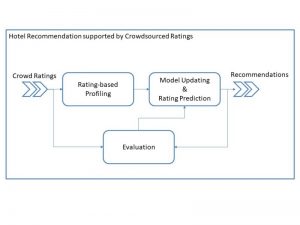In the last decades, traveling has significantly changed due to the evolution and popularization of information and communication technologies, namely, mobile devices. These devices incorporate significant computing and communication capabilities, enabling users to generate and share large volumes of data in crowdsourcing platforms. This information is known as crowdsourced data.
Crowdsourcing has become an essential source of information for tourism stakeholders. Every day, tourists leave large volumes of feedback data in the form of posts, likes, textual reviews, and ratings in dedicated crowdsourcing platforms such as Expedia or TripAdvisor. The crowdsourced information, which classifies tourism resources based on prior tourist experiences, is highly influential since it conditions the behavior of future tourist planning and decision-making. Particularly, in the case of hotels, tourists use ratings to express their opinion regarding the different aspects of the service, for example, comfort, cleanliness, or staff. The analysis of this type of data stream allows the discovery of important knowledge regarding tourists and tourism resources. It is the case of dedicated recommendation engines, which process crowdsourced data with the help of data mining techniques, to create personalized recommendations for guiding and enhancing the tourist experience.

A multi-disciplinary Iberian team has conducted a survey on the techniques for the analysis and prediction of hotel ratings based on crowdsourced data. The survey reports and compares multiple rating-based profiling, recommendations, and evaluation techniques to identify research challenges and tendencies. Due to the volume and frequency of the crowd shared hotel-related events, the team concluded that the trends in this field are, in terms of profiling, to build trust and reputation models of the crowd contributors; to adopt feature-based modeling for dimensionality reduction; and, in terms of hotel rating prediction, to design stream-based recommendation engines, which explore the incoming information to dynamically update the models.
Kindly contributed by the authors.

















